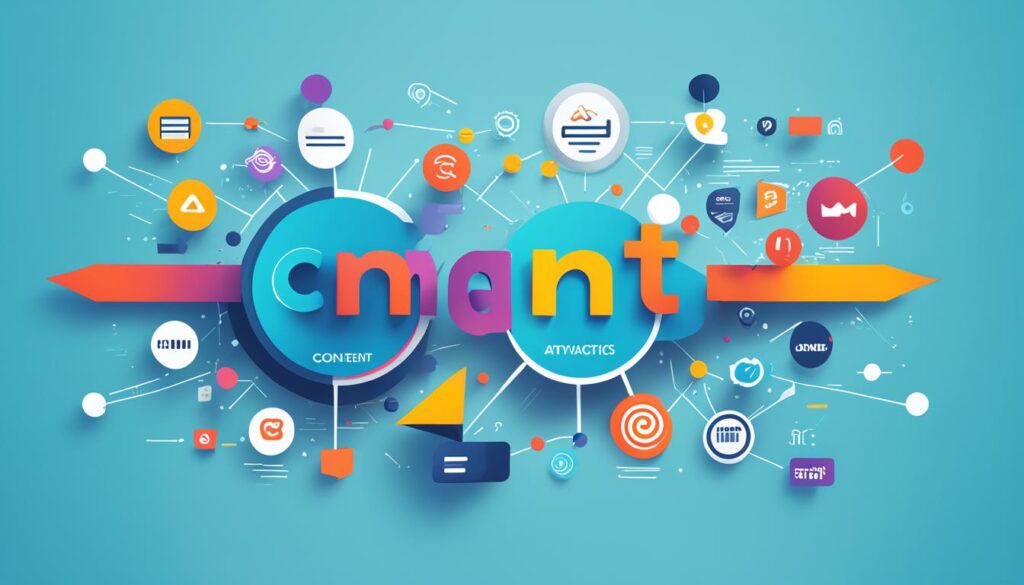In today’s fast-paced digital world, event marketing has become an essential tool for businesses to connect with their target audience and create meaningful experiences. Whether it’s a conference, trade show, or product launch, successful events require effective marketing strategies to drive attendance and boost engagement.
By leveraging the power of Big Data and incorporating data-driven event optimization techniques, businesses can maximize event ROI and drive attendance with data insights. Utilizing advanced event planning software and event registration technology, organizers can track event attendance, monitor audience engagement, and leverage data analytics to make informed marketing decisions.
In this article, we will explore the key strategies for leveraging Big Data in event marketing. From defining your target audience and creating compelling content to utilizing social media platforms and collaborating with influencers, we will provide practical tips and insights to help you optimize your event marketing efforts.
Key Takeaways:
- Define your target audience through market research to tailor your event marketing efforts effectively.
- Create compelling content in various formats to generate interest and excitement.
- Utilize social media platforms to reach a larger audience and build engagement.
- Collaborate with influencers and strategic partners to expand event visibility.
- Monitor and analyze performance using analytics tools to make data-driven marketing decisions.
Define Your Target Audience
One of the key components of successful event marketing is defining your target audience. By understanding who you want to attract to your event, you can shape your entire marketing strategy to effectively connect with and engage your desired participants.
Before diving into your event marketing efforts, conduct thorough market research to gain insights into the demographics, interests, and preferences of your potential attendees. This information will guide your decisions in terms of messaging, promotional channels, and content creation.
Knowing your target audience allows you to tailor your marketing efforts to their specific needs and preferences, increasing the chances of attracting and engaging the right attendees.
Market research plays a crucial role in defining your target audience. By analyzing demographic data such as age, gender, location, and occupation, you can gain valuable insights into who your event should be targeted towards.
Additionally, identifying the interests and preferences of your potential attendees will help you create content and messaging that appeals to them. Whether they are tech enthusiasts, fitness enthusiasts, or business professionals, understanding their interests can help you craft marketing materials that resonate with them.
Developing Audience Personas
To create a comprehensive understanding of your target audience, consider developing audience personas. These personas represent your ideal attendees and serve as a reference point for your event marketing strategy.
When creating an audience persona, consider factors such as age, occupation, industry, interests, challenges, and goals. A well-defined persona helps you empathize with your audience and develop messaging that speaks directly to their needs and desires.
Messaging and Promotional Channels
Once you have a clear picture of your target audience, use this information to inform your messaging and choose the most effective promotional channels.
“Speak the language of your target audience. Craft messages that resonate with their values, aspirations, and pain points. By understanding their unique perspective, you can build a stronger connection and create engagement.”
Consider the preferred communication channels of your target audience. Are they active on social media platforms like Facebook, Instagram, or LinkedIn? Do they rely on email for professional communication? By selecting the appropriate promotional channels, you can reach your target audience more effectively.
Remember to tailor your content creation efforts to your target audience as well. Develop relevant and valuable content that addresses their interests and needs. This could include blog posts, videos, infographics, or podcasts. By offering content that resonates with your audience, you will build credibility and trust, increasing the likelihood of attracting and engaging the right attendees.
Create Compelling Content
In the realm of event marketing, one thing is clear: content is king. To entice and engage your target audience, it is crucial to craft compelling content that not only informs but also excites. By leveraging various formats such as blog posts, videos, infographics, and social media posts, you can create a buzz around your event that captures attention and drives attendance.
Storytelling techniques play a vital role in connecting with your audience on an emotional level. By weaving narratives that resonate with their experiences, aspirations, and pain points, you can forge a powerful emotional connection that compels them to take action. Show them the value they will gain by attending the event and how it aligns with their goals. Emphasize the exclusive insights, networking opportunities, and knowledge sharing that will provide immense value to their personal and professional growth.
When crafting your content, keep your target audience in mind. By understanding their preferences, interests, and pain points, you can tailor your messaging to address their specific needs. Focus on delivering a clear and concise value proposition that highlights the unique benefits of attending your event.
“The key to creating compelling content lies in understanding your audience and delivering value that resonates with their needs and desires.” – Jane Anderson, Content Marketing Expert
An effective way to create compelling content is by incorporating visuals. Utilize eye-catching graphics, images, and videos that draw attention and communicate your message effectively. Infographics, for example, are a great tool for presenting data and complex information in a visually appealing and digestible format.

A strong call-to-action (CTA) should be present in your content to prompt your audience to take the next steps. Whether it’s registering for the event, downloading a guide, or subscribing to your newsletter, make it clear and easy for them to engage further.
Remember, compelling content is not only about providing valuable information; it’s about evoking emotions, sparking curiosity, and creating a lasting impression. By utilizing storytelling techniques, emotional connection, and a strong value proposition, you can create content that drives interest, fosters engagement, and ultimately leads to increased event registrations.
Utilize Social Media Platforms
Social media platforms provide a powerful channel for promoting your event and engaging with your audience. Leverage platforms like Facebook, Instagram, Twitter, and LinkedIn to share event updates, behind-the-scenes content, and exclusive offers. These platforms offer a wide reach and allow you to connect directly with your target audience.
One effective strategy is to regularly post event updates to create anticipation and keep attendees informed. This can include announcements about guest speakers, schedule changes, and any other relevant information that will pique the interest of potential attendees. By providing timely and engaging event updates, you can build excitement and generate buzz around your event, increasing the likelihood of attracting more attendees.
Another way to effectively utilize social media platforms is to provide exclusive behind-the-scenes content. This can include sneak peeks of event preparations, interviews with key speakers or performers, or glimpses into the venue setup. By sharing this exclusive content, you create a sense of exclusivity and make attendees feel like insiders, which can further drive their enthusiasm and engagement.

Utilizing event-specific hashtags is another effective strategy to encourage attendees to share their experiences and generate user-generated content. Create a unique hashtag for your event and encourage attendees to use it when posting about the event on social media. This will help you track engagement and also allow attendees to connect with others who are attending the event.
A key aspect of social media engagement is responding to comments, questions, and feedback promptly. Encourage attendees to ask questions or share their thoughts about the event and make sure to reply in a timely manner. Engaging with your audience shows that you value their input and creates a sense of community around your event.
By leveraging social media platforms, you can build excitement, foster engagement, and reach a larger audience, ultimately driving event attendance. With the right strategies in place, your event can gain widespread visibility and create a buzz that extends beyond its physical presence.
Collaborate with Influencers and Partners
Collaborating with influencers and strategic partners can be a game-changer when it comes to amplifying the reach and credibility of your event. By joining forces with industry leaders who have a genuine interest and resonance with your target audience, you can expand your event’s visibility and attract a larger audience.
When selecting influencers or partners, consider their expertise, reach, and engagement within your industry. Look for those who have a strong online presence and a dedicated following that aligns with your event’s target audience. By collaborating with them, you can tap into their existing network and expand your event’s reach organically.
There are various ways to collaborate with influencers and partners, depending on your event goals and resources. Co-creating content, hosting interviews or live streams, and offering exclusive discounts are just a few examples of collaborative opportunities that can generate buzz and elevate your event’s visibility.
By collaborating with influencers and partners, you not only benefit from their established credibility and reach but also tap into their unique perspectives and expertise, adding value to your event experience.
One effective approach is to have influencers or thought leaders host interviews or panel discussions. This not only brings valuable insights to your event but also exposes your audience to respected voices within your industry. By leveraging their expertise and credibility, you can enhance your event’s reputation and attract more attendees.
Another way to collaborate is by co-creating content with influencers and partners. This could involve guest blog posts, social media takeovers, or joint webinars. By leveraging their knowledge and expertise, you can provide valuable content to your audience while expanding your event’s visibility through their networks.
Example:
| Influencer/Partner Collaboration Examples | Benefits |
|---|---|
| 1. Industry expert interview series | – Amplify event reach – Enhance event credibility – Provide valuable insights to attendees |
| 2. Co-creating content with influencers | – Expand event visibility – Tap into influencer’s audience – Enhance event content with diverse perspectives |
| 3. Exclusive discount codes with partners | – Drive ticket sales – Provide added value to attendees – Encourage partner promotion |
| 4. Live streaming keynote sessions | – Increase event engagement – Extend event reach to virtual attendees – Create a sense of exclusivity |
Remember to establish clear goals, expectations, and guidelines when collaborating with influencers and partners. Effective communication and mutual value exchange are key to successful collaborations. By leveraging the influence and reach of influencers and partners, you can create a buzz around your event, attract a larger audience, and drive event attendance.

Monitor and Analyze Performance
Once your event marketing strategies are in motion, it’s essential to continually monitor and analyze their performance. By utilizing analytics tools, you can gain valuable insights into various metrics, such as website traffic, social media engagement, email open rates, and ticket sales.
Monitoring website traffic allows you to track the number of visitors to your event’s website and understand which marketing channels are driving the most traffic. By analyzing this data, you can optimize your strategies to focus on the channels that perform the best.
Social media engagement is another critical metric to track. It gives you an indication of how well your event is resonating with your target audience. By monitoring social media engagement, such as likes, shares, and comments, you can identify content that generates the most interest and adjust your approach accordingly.
Additionally, monitoring email open rates provides insight into the effectiveness of your email marketing campaigns. Analyzing this data helps you refine your email content, subject lines, and timing to improve open rates and increase attendee engagement.
Finally, tracking ticket sales is crucial for evaluating the success of your event marketing efforts. By understanding which promotional channels or strategies are driving ticket sales, you can make data-driven decisions for future events and allocate resources effectively.
By monitoring and analyzing performance through various analytics tools, you can identify areas of improvement and make data-driven decisions to optimize your event marketing strategy. This approach will enable you to maximize attendance and participant engagement, ensuring the success of your events.
FAQ
How can Big Data and event marketing be used together to maximize event attendance and engagement?
By leveraging Big Data, businesses can gain valuable insights into their target audience’s demographics, interests, and preferences. This information can then be used to create targeted marketing campaigns that resonate with potential attendees, increasing the likelihood of event registration and attendance.
Why is it important to define your target audience before creating an event marketing strategy?
Defining your target audience allows you to tailor your event marketing efforts towards their specific needs and preferences. By understanding your audience’s demographics, interests, and preferences, you can create compelling content and choose the right promotional channels to effectively reach and engage potential attendees.
What role does compelling content play in event marketing?
Compelling content is essential in event marketing as it helps generate interest and excitement among potential attendees. By creating captivating content that informs and excites, businesses can demonstrate the value attendees will gain from the event, increasing the likelihood of registration and attendance.
How can social media platforms be utilized to promote events and engage with the audience?
Social media platforms such as Facebook, Instagram, Twitter, and LinkedIn provide businesses with a powerful channel to promote their events and engage with their target audience. By sharing event updates, behind-the-scenes content, and exclusive offers, businesses can build excitement, foster engagement, and reach a larger audience, ultimately driving event attendance.
How can collaborating with influencers and strategic partners amplify event reach and credibility?
Collaborating with influencers and strategic partners helps businesses tap into their existing followers and expand the visibility of their event. By co-creating content, hosting interviews or live streams, or offering exclusive discounts, businesses can leverage the influence and reach of influencers and partners to attract a larger audience and increase event attendance.
Why is it important to monitor and analyze the performance of event marketing efforts?
Monitoring and analyzing the performance of event marketing efforts allows businesses to evaluate which strategies are driving the most significant results. By utilizing analytics tools to track website traffic, social media engagement, email open rates, and ticket sales, businesses can make data-driven decisions for future events, optimizing their event marketing strategy and maximizing attendance and participant engagement.








